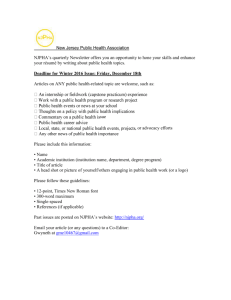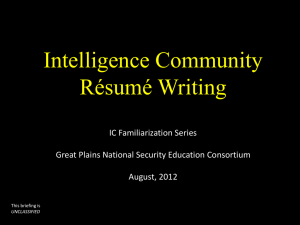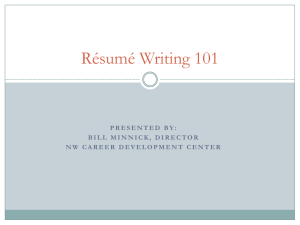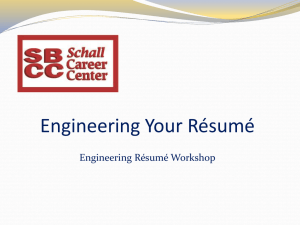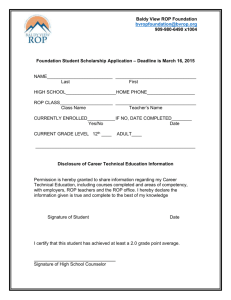MOS/MOC Career Field
advertisement
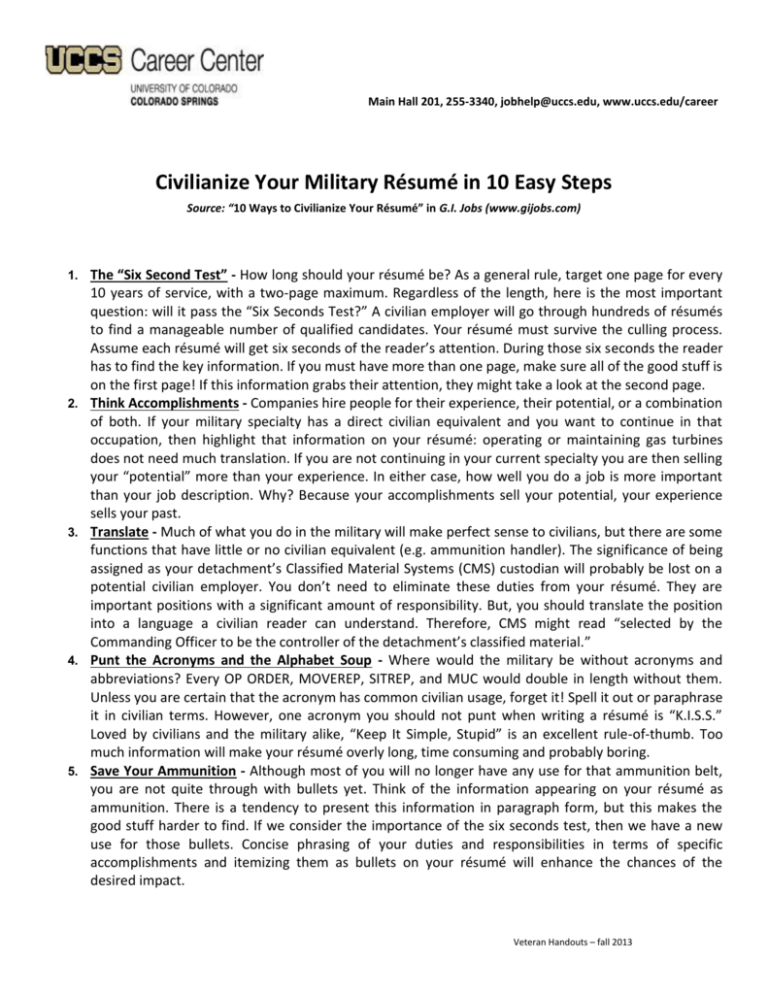
Main Hall 201, 255-3340, jobhelp@uccs.edu, www.uccs.edu/career Civilianize Your Military Résumé in 10 Easy Steps Source: “10 Ways to Civilianize Your Résumé” in G.I. Jobs (www.gijobs.com) 1. 2. 3. 4. 5. The “Six Second Test” - How long should your résumé be? As a general rule, target one page for every 10 years of service, with a two-page maximum. Regardless of the length, here is the most important question: will it pass the “Six Seconds Test?” A civilian employer will go through hundreds of résumés to find a manageable number of qualified candidates. Your résumé must survive the culling process. Assume each résumé will get six seconds of the reader’s attention. During those six seconds the reader has to find the key information. If you must have more than one page, make sure all of the good stuff is on the first page! If this information grabs their attention, they might take a look at the second page. Think Accomplishments - Companies hire people for their experience, their potential, or a combination of both. If your military specialty has a direct civilian equivalent and you want to continue in that occupation, then highlight that information on your résumé: operating or maintaining gas turbines does not need much translation. If you are not continuing in your current specialty you are then selling your “potential” more than your experience. In either case, how well you do a job is more important than your job description. Why? Because your accomplishments sell your potential, your experience sells your past. Translate - Much of what you do in the military will make perfect sense to civilians, but there are some functions that have little or no civilian equivalent (e.g. ammunition handler). The significance of being assigned as your detachment’s Classified Material Systems (CMS) custodian will probably be lost on a potential civilian employer. You don’t need to eliminate these duties from your résumé. They are important positions with a significant amount of responsibility. But, you should translate the position into a language a civilian reader can understand. Therefore, CMS might read “selected by the Commanding Officer to be the controller of the detachment’s classified material.” Punt the Acronyms and the Alphabet Soup - Where would the military be without acronyms and abbreviations? Every OP ORDER, MOVEREP, SITREP, and MUC would double in length without them. Unless you are certain that the acronym has common civilian usage, forget it! Spell it out or paraphrase it in civilian terms. However, one acronym you should not punt when writing a résumé is “K.I.S.S.” Loved by civilians and the military alike, “Keep It Simple, Stupid” is an excellent rule-of-thumb. Too much information will make your résumé overly long, time consuming and probably boring. Save Your Ammunition - Although most of you will no longer have any use for that ammunition belt, you are not quite through with bullets yet. Think of the information appearing on your résumé as ammunition. There is a tendency to present this information in paragraph form, but this makes the good stuff harder to find. If we consider the importance of the six seconds test, then we have a new use for those bullets. Concise phrasing of your duties and responsibilities in terms of specific accomplishments and itemizing them as bullets on your résumé will enhance the chances of the desired impact. Veteran Handouts – fall 2013 Civilianize Your Military Résumé in 10 Easy Steps – Page 2 6. 7. 8. 9. 10. No Job-Hoppers Here - Most military personnel have multiple jobs and multiple duty stations during their contract, enlistment or career. The list gets even longer if schools and training are included. Listing every job on your résumé may make you look like a job hopper. Combine similar experiences without paying strict attention to the timeline. Perhaps the easiest way is to use an all-inclusive timeline statement at the beginning of your experience section. Show the reader that you may have had six different jobs in three different locations in the last six years, but they were all with the same employer! For example, the phrase “Machinist’s Mate, U.S. Navy (1998-2004)” is the first line in the “experience” section, followed by an outline of the actual assignments during that timeframe. The “M” Word - Guess which word appears the most often on the typical military performance evaluation or fitness report? “Manage” and all of its forms: management, manager, manages, managing, managed. Not surprisingly, the same is true with résumés written by separating military personnel. It is a wonderful word, because it says so much. But for that same reason, it also says too little. What do you really mean when you use that word? Be careful – civilians do not use it with the same frequency or generality that you do. When writing your résumé, force yourself to say what you really mean. Perhaps words like control, coordinate, lead or supervise would be more descriptive. If you have to use it, then use it with a modifier (financial management, logistics management or personnel management). In the corporate sector, you are technically not a manager unless you have both people working directly for you and profit and loss responsibility for your unit. It would be the rare individual who would be handed both of these on his or her first day on the job. Accordingly, use the “M” word as specifically and sparingly as possible. Move Your Rank or Rating But Don’t Hide It - You are seeking a civilian job. It is time to start thinking and looking like a civilian. You may think of yourself as “MM3 Michael S. Ortiz, USN,” but do not open with that statement. On your résumé, you are now just plain Michael S. “Mike” Ortiz. Why? Many civilians have a negative stereotype regarding military personnel when it comes to formality and rank structure. Beginning your résumé with your rank or rating will just reinforce that perception. On the other hand, there is much about your military experience that works in your favor. Some military service members are under the impression that they should completely “sanitize” their résumés, and remove all things military. Going to this extreme is a mistake. There are hundreds of civilian employers that want to hire you because of that military experience. Training and Education: Front and Center - One of the reasons so many civilian companies like to hire military personnel is the built-in training and education. Many service members have college degrees, and those that do not will often have a significant amount of technical or specialty training courtesy of Uncle Sam. Whether or not this training and education is directly relevant to the civilian sector, companies like to hire educated people, especially those who have done well in that environment. Accordingly, put this information on your résumé where they can easily find it. Remember the six seconds test! Make Yourself Easy to Find - Your résumé must include your contact information. Assuming the résumé does its job, a potential employer will contact you to obtain further information and set up an interview. When it comes to finding you, many military personnel are at a disadvantage. Where are you stationed? CONUS? Overseas? Deployed? On a ship? Under the ocean? Not allowed to say? Unless the answer is CONUS, you are probably at either a geographic or a time zone disadvantage. However, unlike a civilian employer that may terminate employment if they know you were on a job search, the military assists service members in its transition to a new career. If you are permitted to do so, make sure your cell phone number, work phone number and e-mail address are on your résumé. If not, perhaps there is a reliable person with access to your personal phone number and/or e-mail account who can act as a relay for you. Veteran Handouts – fall 2013 Main Hall 201, 255-3340, jobhelp@uccs.edu, www.uccs.edu/career Common Military-to-Civilian Translations Source: “Common Military-to-Civilian Translations” in ClearanceJobs (www.clearancejobs.com) Love it or hate it, the résumé is still the expected job search instrument of choice used to showcase past work experiences, marketable skills, obvious superpower abilities and applicable shiny credentials. Don’t get caught up in making sure your positional military title translates. Focus more on communicating the functional (skill) area of your job title. That said, here are some common translations that may be helpful. You know it as: Civilian employers will understand it as: NCOIC, Watch Captain,Petty Officer of the Watch Commander, Chief Executive Officer (XO) Action Officer (AO) TDY/TAD PCS OER/NCOER MOS/MOC Commanded Battalion, Unit, Platoon Mission Combat/War Headquarters Subordinates Service members Security Clearance Military Personnel Office (MILPO); Personnel Action Center (PAC) Regulations Reconnaissance TDA/MTOE Supervisor, Manager, Coordinator Division Head, Director, Senior Manager Deputy Director, Assistant Manager Analyst (or Senior Analyst if applicable) Business travel Relocation Performance Appraisal Career Field Supervised, Directed Organization, Agency, Department Responsibility, Task, Objective, Job Hazardous Conditions, Conflict Headquarters, Corporate Office Employees, Co-Workers Employees, Co-Workers, Colleagues, Personnel, Individuals Security Clearance Personnel Office Guidance, Policy, Instructions Data Collection, Survey, Analysis Organizational Structure, Material Resources, Manpower Additional Tips You Can Use Awards: You might have a laundry list of ARCOMs, MSMs, and AAMs and that is a good thing. Clearly, you did your job well. Don’t, however, fill your resume with each and every one of them. Simply mention, where appropriate, that you received awards for outstanding job performance. If there is something critical to mention about a certain award that propels your case for the job further, then it is fine to elaborate on that particular award. Job Titles: Don’t get caught up in making sure your positional military title (Captain, Major, Sergeant) translates. Focus more on communicating the functional area of your job title (Communications Technician, Emergency Medical Technician, Nurse). Training: Make your classroom achievements easy to understand. Remember, it is not necessary to list all the training you’ve completed; Stick to mentioning the most recent and relative ones. Veteran Handouts – fall 2013 Main Hall 201, 255-3340, jobhelp@uccs.edu, www.uccs.edu/career Resources to Help Military/Veterans Transition to Civilian Life 1) 2) 3) 4) 5) 6) 7) 8) 9) 10) 11) 12) G.I. Jobs – Your Guide to Post-Military Success: www.gijobs.com Clearance Jobs – The Undisputed Leader in Defense Industry Careers: www.clearancejobs.com USAJOBS – Official one-stop source for Federal jobs: www.usajobs.gov Military.com Network – Largest Military and Veteran Membership Organization: www.military.com Transition Assistance Online (TAOnline) – Top Leader in Providing Veteran Jobs: www.taonline.com Career One Stop – Sponsored by the U.S. Dept. of Labor: www.acinet.org Veteran Recruiting Services (VRS) – Reliable means to bring employers & veterans together: www.veteranrecruiting.com Military One Source – Department of Defense funded program providing comprehensive information on every aspect of military life: www.militaryonesource.mil/transition Make the Connection – Public Awareness Campaign by the U.S. Department of Veteran Affairs: www.maketheconnection.net Moving Forward: Overcoming Life’s Challenges – Free online educational and life coaching program that teaches problem solving skills: www.startmovingforward.org After Deployment – Resources for making the transition to civilian life: www.afterdeployment.org/topicswork-adjustment UCCS Office of Veteran and Military Student Affairs – Provides transition assistance to veteran and military service members and their families: www.uccs.edu/military Veteran Handouts – fall 2013
